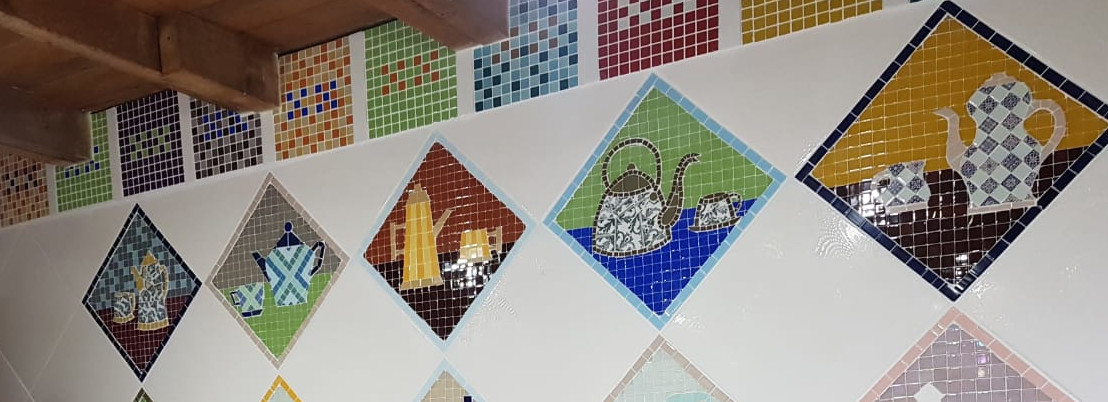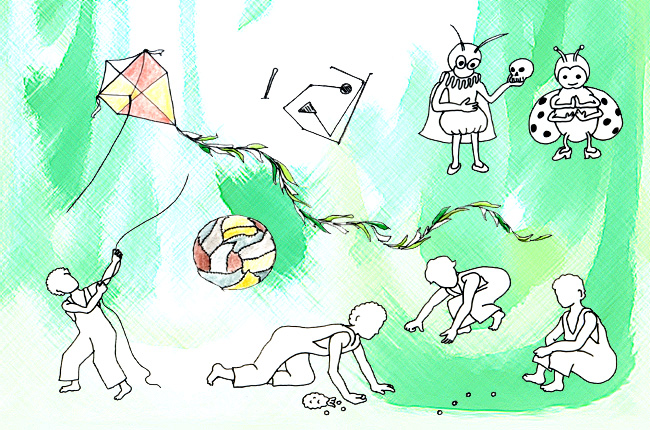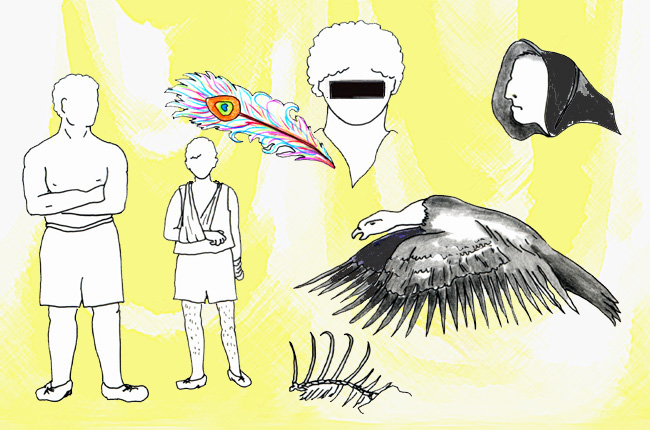13. Ladybugs, entertainment and rays of light never erased
Translated by Angela Telles-Vaz
The writer Dalton Trevisan, in his short story, The Spy, writes that those girls never smiled. A lie! I think it’s a lie! The child’s soul is not a rope stretched forever. There must be, here and there, far from the correction paddle and soon after meals, ephemeral moments when the song goes high, the smile burst and the toy amuses.
Because, if I remember those lost days, I see that the pale herons of the soft memories are the ones that float in the empty blue. Not the claws, nor the poisoned beak of priests, correction paddles and bed wetter. The toys are, in a greater length, what handcuff my soul to my memories. And we smiled. In those plains, between the abyss of one terror and another, we smiled. We had many long moments of peace. And those moments, now, excite me like live sand of an enchanted wood. The sand rises and becomes alive. Between one moment now and one later on, we were happy. There’s no reason to lie. I was happy.
There they come quietly, my little white dwindling ghosts, asking us to recommence our mirth. I am myself unable to play. They, the ghosts live inside of me. Nevertheless, the ghost that should be me, that boy dissolved in an almost mist of a forgotten of time, always with a sad gaze and the face always looking to the floor, I feel that that boy, I feel that that little boy has died forever. His sin was to be chained completely to me and he gave way to a man that destroyed him. Today, the most he can do is to dictate me, from afar, the things that he lived there, the way he lived them.
As for the others, they stopped growing inside of me. They are forever small, forever boys. If I met them today, they wouldn’t be my friends anymore. They would also be adults that killed my little friends. We would, those of today and yesterday, be separated by a wall: on one side, what they are now and on the other, the little people I met at the orphanage.
This wall has cracks. Yes, the wall has cracks and today we can observe them while playing on the other side. They don’t realize that we the adults of today can still watch them. They didn’t live for our today but in their own moment.
A game that was always repeated at short intervals was the one with the caves for the ladybugs. Somewhere in the courtyard, the ground was muddy. I don’t know by what kind of miracle colored glass shards turned up in the courtyard. We would keep them with an enormous care. They were valuable assets. When we could get a little shard we washed it up to full transparency and ran in search of ladybugs. They were of a brownish red, round and painted black. There were also the little long ones, green, yellow, but those were very suspicious and fled easily. When the prey was caught, we closed the poor thing inside a match box, another miracle. Then, we started the construction of the cave, a tiny hole in the clay. After the clay was well smoothed we put the ladybug inside it and covered with the shard. While closing, the glass would get blurred but by spitting we turned it sparkling again.
The insect walked back and forth and we watched it in that almost darkness.
The funny thing is that I never found the ladybug on the next day. Either the cave lost its glass, completely disappeared, or looked exactly the same but was empty.
We also caught crickets. They were black and tiny. Someone once said that if we buried the head of a cricket, some days later it would turn into a skull. We would use our fingers to roughly take the head of the poor thing off. The body was thrown away and the head buried. I never made it through the experiment. We would loose where the gravesite was, forget to look for it, whatever.
Sometimes we played ball. The balls were a result of a patient expression of primitive craftsmanship. First, rags of cloths were obtained. The threads came from the overalls. The empty afternoons gave us the needles. Later, a small ball was made from the worthless rags by sewing the small pieces of toughest cloth around it. It was a succession of sewing the small pieces of cloth and the ball would get fatter. Here and there, additional cloth was used to fix the sphere flaws. With little, the ball was finished, round and heavy. Of course this task was done by one of the older boys.
Some of the boys had a tennis ball and a heron, paler than all the others, tells me about larger balls made of rubber. Indeed I can see them over there, playing with a ball that seems much larger than ours.
Once, during a soccer game, uproar happened in front of the goal area, so many people gathered around the ball that remained almost frozen, in the small space between dozens of feet that kicked themselves. The ball threatened to go to one side, a foot sent it back, another changed its direction, we all began to laugh aloud kicking aimlessly at the same time, the poor ball in a total indecision, bruised, kicked, until the bodies started to become unbalanced forming a pyramid of sweat and bodies in distress kept laughing and no one could breath anymore…
The gods of Homer were expert in the Homeric laughter. But they never laughed that laughter of ours.
But to what advantage? It was enough to ask any one to enter in the middle of the match and the rules lost its sacredness and there came one and another and as many more that wished to come. There were lots of uproars like that but that was the most significant one.
We also used to go to the soccer field in town. There were tournaments among the inhabitants of the region. Did some of us participate? What do I know? They played, the older students watched and we the little ghosts ran after the locusts and crickets. The little boxes would come back packed with them and after opening the boxes on our return, we came across a handful of little dead bugs. But we didn’t want them to die!
During one of those outings, there was a fact that struck me a lot. Sinuca was narrating the game, an achievement that required high efficiency. He kept screaming, excited, happily showing off. Everyone stopped to hear him. Then, he asked an older one to continue. The young man began, the words didn’t come out, he stuttered, stumbled, Sinuca rebuked him, it was necessary to shout, warm up, he was lifeless. And then, he gave a demonstration of a narration, loud, quick and contagious.
I never forgot how I was sad at that moment. I had the distinct impression that, in order to do something, it was absolutely necessary to be free.
The older boys had other types of toys. They played with a coarse knife, marbles and flying kites.
To be able to play with a coarse knife, it was necessary to have one, which was a rarity, perhaps because they can turn into a dangerous weapon. The clay ground was well smoothed (this game always happened after it rained), a drawing was done for each player. They were the “houses” of each one. The first person threw the course knife which should stick standing on the ground. A straight line was drawn from the house to the point where the course knife fell. And he would continue. The goal was to engage and close the enemy’s house. Missing the fall, another one began. Two spirals were made around the two houses. The winner was the one who involved the enemy by hitting his own line closing his territory.
All the marbles ended up belonging to a restricted number of experts. They were only interested in playing for real. I was always amazed by the aim of those semi-gods. They were called “aimers”. I didn’t know how to hold the marble, never guessed right. I was the “fingerstall”. I don’t remember all the rules. One of the games was played with an arch with the marbles to be hit. Another game had three holes, it was necessary to go into each hole and after that hit someone. The last game only had a small hole on the ground and I really don’t remember the rules. The name of this last one was “little ass”.
The kites were a privilege of few. Eternal Saints! Where did those lines, those papers, those sticks, those razor blades, that glue came from? The privileged worked hours with the bamboo sticks. Then, they did the frame. Some, more sophisticated, had the luxury of using two colors. After assembling the kite, which I insisted on calling parrot, they stretched the strings along the courtyard and began to grind the glass. Ground glass was mixed with glue and spread along the strings. The goal was to cut the enemy’s string during a cross over between kites so that it would disappear from the sky. The tail was made with strips of rags. A razor blade was tied to the tail of the kite what made it, at the same time, very dangerous and very vulnerable. The kite would easily cut the enemy’s string. On the other hand, this required great expertise because it could cut its own string.
Launching the kite was a ritual. If a kite was up high and especially, if it belonged to an “outsider”, it was considered a real treat. Our hero had to loosen the string little by little, with incredible dexterity to wind the string round a piece of stick, pulling the string, nose down, pulling more string…
A small piece of colored paper hung against a blue, very blue. Floating like a majestic angel observing the people of Sodom, keeping the vigil. It was extremely pretty.
No priest would be sufficient to diminish that joy.
to be continued on next sunday.


